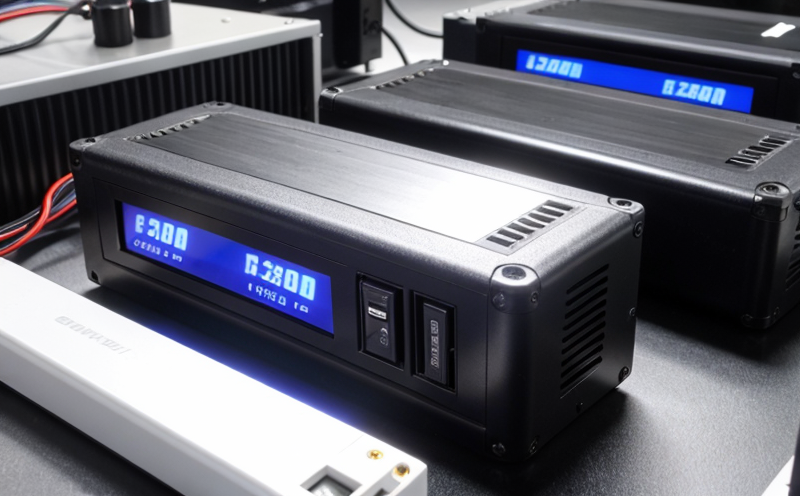NF EN 61951-2 Nickel Metal Hydride Portable Battery Performance Testing
The NF EN 61951-2 standard is specifically designed for the performance testing of nickel metal hydride (NiMH) portable batteries. This test procedure evaluates critical parameters that are essential in ensuring high reliability and safety, particularly in applications where NiMH batteries are commonly used such as medical equipment, consumer electronics, and emergency lighting.
The testing process outlined in NF EN 61951-2 is comprehensive, covering a range of key performance indicators. These include internal resistance measurement, capacity retention assessment under various conditions, cycle life determination, and self-discharge rate evaluation. The standard also specifies the necessary equipment and environmental requirements to ensure accurate and repeatable test results.
Internal resistance testing helps identify potential issues within the battery that could affect its overall performance and lifespan. Capacity retention is crucial for understanding how well a battery maintains its charge over time, which is particularly important in portable devices where extended usage between charges is desired. Cycle life tests provide insight into the number of full discharge/recharge cycles before significant capacity degradation occurs.
Self-discharge rate evaluation ensures that batteries maintain their stored energy efficiently, preventing unexpected performance drops when needed most. Compliance with NF EN 61951-2 guarantees adherence to international standards and provides assurance regarding product quality and safety.
To perform these tests accurately, specialized equipment such as battery testers capable of measuring internal resistance, capacity analyzers for assessing retention rates, and cycle test systems are required. Environmental chambers may also be necessary depending on the specific conditions outlined in the standard.
The NF EN 61951-2 procedure is particularly relevant for manufacturers seeking to meet regulatory requirements or improve product performance through rigorous quality control measures. By adhering strictly to this standard, companies can ensure their NiMH portable batteries are reliable and safe across various end-use scenarios.
Quality managers responsible for overseeing production processes will benefit greatly from knowing how NF EN 61951-2 applies directly to their operations. Compliance officers should consider it when reviewing compliance documentation related to battery safety standards. R&D engineers can leverage this standard during new product development stages by incorporating validated test methods into their research plans.
Procurement professionals involved in sourcing components for NiMH portable batteries will find NF EN 61951-2 invaluable as they specify vendor requirements and evaluate supplier offerings based on consistent, industry-recognized performance criteria.
Benefits
The implementation of NF EN 61951-2 Nickel Metal Hydride Portable Battery Performance Testing brings numerous advantages to both manufacturers and end-users. For manufacturers, meeting these stringent testing requirements enhances brand reputation by demonstrating commitment to excellence in product design and manufacturing.
Clients gain confidence knowing that the batteries they purchase undergo thorough evaluation ensuring superior performance and extended operational life. This leads to increased customer satisfaction and loyalty which translates into better market positioning for companies adhering to such high standards.
In terms of regulatory compliance, businesses avoid costly recalls or non-compliance penalties by proving adherence to internationally recognized norms like NF EN 61951-2. Additionally, this standard supports continuous improvement initiatives aimed at reducing defects and improving overall product quality.
From an environmental perspective, reliable NiMH batteries contribute positively towards sustainability goals by offering longer-lasting solutions that minimize waste generation. This aligns with global efforts to reduce reliance on disposable products and promote sustainable practices within industries utilizing portable electronics powered by these cells.
Industry Applications
Nickel metal hydride (NiMH) batteries play a vital role in various sectors where portability, longevity, and safety are paramount. In the medical field, NiMH batteries power essential devices such as heart monitors, defibrillators, and portable diagnostic tools used in remote locations or during emergencies.
Consumer electronics companies utilize NiMH batteries for products like digital cameras, laptops, smartphones, and other gadgets requiring reliable power sources without compromising on size or weight. The automotive industry occasionally employs these types of batteries for hybrid vehicles where they serve as auxiliary power units supporting electric motors.
Emergency services heavily rely on NiMH battery-powered equipment including flashlights, radios, and communication devices that must function reliably under challenging conditions. Public transportation systems sometimes use NiMH batteries to supplement existing energy storage systems in buses or trams.
Eurolab Advantages
At Eurolab, our expertise in NF EN 61951-2 Nickel Metal Hydride Portable Battery Performance Testing sets us apart from other laboratories. Our state-of-the-art facilities equipped with cutting-edge instruments ensure precise and accurate testing results every time.
We employ skilled technicians who are fully trained and certified according to the latest industry best practices ensuring that all tests conducted adhere strictly to NF EN 61951-2 requirements. Our comprehensive approach includes not only performing the specified test procedures but also providing detailed reports highlighting areas of improvement along with recommendations for enhancement.
Our commitment to quality is reflected in our strict adherence to international standards which instill trust among clients worldwide. We pride ourselves on delivering timely, accurate results that meet or exceed expectations set forth by both regulatory bodies and internal quality assurance departments.





